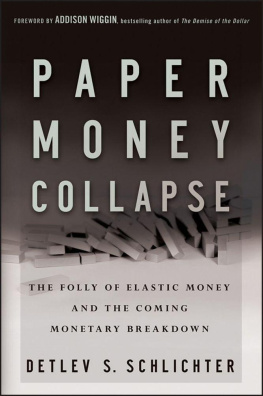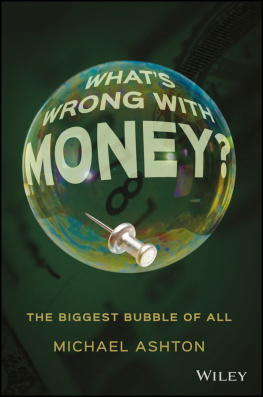Table of Contents
Copyright 2011 by Detlev S. Schlichter. All rights reserved.
Published by John Wiley & Sons, Inc., Hoboken, New Jersey.
Published simultaneously in Canada.
No part of this publication may be reproduced, stored in a retrieval system, or transmitted in any form or by any means, electronic, mechanical, photocopying, recording, scanning, or otherwise, except as permitted under Section 107 or 108 of the 1976 United States Copyright Act, without either the prior written permission of the Publisher, or authorization through payment of the appropriate per-copy fee to the Copyright Clearance Center, Inc., 222 Rosewood Drive, Danvers, MA 01923, (978) 750-8400, fax (978) 646-8600, or on the Web at www.copyright.com. Requests to the Publisher for permission should be addressed to the Permissions Department, John Wiley & Sons, Inc., 111 River Street, Hoboken, NJ 07030, (201) 748-6011, fax (201) 748-6008, or online at http://www.wiley.com/go/permissions.
Limit of Liability/Disclaimer of Warranty: While the publisher and author have used their best efforts in preparing this book, they make no representations or warranties with respect to the accuracy or completeness of the contents of this book and specifically disclaim any implied warranties of merchantability or fitness for a particular purpose. No warranty may be created or extended by sales representatives or written sales materials. The advice and strategies contained herein may not be suitable for your situation. You should consult with a professional where appropriate. Neither the publisher nor author shall be liable for any loss of profit or any other commercial damages, including but not limited to special, incidental, consequential, or other damages.
For general information on our other products and services or for technical support, please contact our Customer Care Department within the United States at (800) 762-2974, outside the United States at (317) 572-3993, or fax (317) 572-4002.
Wiley also publishes its books in a variety of electronic formats. Some content that appears in print may not be available in electronic books. For more information about Wiley products, visit our web site at www.wiley.com.
Library of Congress Cataloging-in-Publication Data:
Schlichter, Detlev S., 1964
Paper money collapse : the folly of elastic money and the coming monetary breakdown / Detlev S. Schlichter.
p. cm.
Includes index.
ISBN 978-1-118-09575-1 (hardback); ISBN 978-1-118-12780-3 (ebk); ISBN 978-1-118-12781-0 (ebk); ISBN 978-1-118-12782-7 (ebk)
1. Paper money. 2. Money supply. 3. Currency question. 4. Credit. I. Title.
HG353.S35 2011
332.4'044dc22
2011015865
To my parents.
The evils of this deluge of paper money are not to be removed until our citizens are generally and radically instructed in their cause and consequences, and silence by their authority the interested clamors and sophistry of speculating, shaving, and banking institutions. Till then, we must be content to return quo ad hoc to the savage state, to recur to barter in the exchange of our property for want of a stable common means of value, that now in use being less fixed than the beads and wampum of the Indian, and to deliver up our citizens, their property and their labor, passive victims to the swindling tricks of bankers and mountebankers.
Thomas Jefferson to John Adams, March 1819
Foreword
Detlev Schlichter is not alone when he writes that the individual decision maker is a driver of economics, but he is clearly in the minority.
That fact stands to reason. During our most recent fiscal upheaval in the United States, one out of every two economists with a job drew his or her paycheck from a government institution.
Your economist, your elected official, and your friendly neighborhood bureaucrat, your policy wonk, even your favorite mainstream journalist believes that youthe individualcouldnt possibly know what you are doing with your own money.
They think youre too stupid to make the right decision when faced with choices in the marketplace.
If you agree with them, then Id respectfully advise you to stop reading this book right now. Youll only take offense at what Mr. Shlichter has to say.
If, on the other hand, you believe that youre capable of making a decision on your own if you believe you can safely buy the goods and services you need when you need (or want) them, then youll take to and welcome Detlev Schlichter right way.
The market economy is not a superior organism that has its own goals, Detlev writes. The economy does not exist to generate positive GDP for the good of a nation. Nor are we servants subject to the whim of the formerly omnipotent Masters of the Universe who run trading desks on Wall Street.
We use moneyour moneyto make transactions. Thats it. All else that follows in this book begins from that simple starting point.
Once you ignore the conventional method of viewing the economy of measuring growth and counting the unemployed a funny thing happens. Failure and bankruptcy become natural events even in a smoothly sailing economy. Viewed in the proper context, failure is not something to be prevented. Its a vital tool on the way to success. We all make mistakes from time to time. Theres no one to blame. But there is a heck of a lot to be learned.
Blasphemy, for some. A Godsend, for others. Ill assume that for the time being, youre in the latter group.
In this book, Detlev doesnt hold back any punches in exposing the flawed concept that is paper currency. I admire his rigor and his clarity as he straddles this unpleasant territory with ease. He doesnt name names. He doesnt bog us down in details. He doesnt enlist GDP charts from across the globe. He leaves the devilish details to other books boasting financial crisis in their title.
Hes not likely to land an HBO contract for the effort, so I suggest you get started with Chapter 1.
If youre of the right mind-set, it will be a pleasant experience, I assure you. Detlevs crisp algebraic prose recalls one of the best systematic financial writers to tackle banking: Murray Rothbard, whose Mystery of Banking offers a succinct account of what began ailing the economy in the 20th century.
Unlike Rothbard, however, Detlev is a practitioner, not an academic.
You have to admire a man from the City who worked 19 years in high-yield income, pursuing the oft-maligned Austrian economics as a hobby at night.
Sometime in 2007, the hobby became his vocation. But his first real wakeup call came in 1998, postruble collapse and LTCM failure. The events themselves werent the problem, Detlev began to see. How government-supported firms reacted is; they got bailed out and sought to manipulate interest rates.
A decade on and bailouts have become the norm. Bankers expect them. And place their bets accordingly. The implied safety net has become the Achilles heel of the entire system.
Today, even as economists, the media, and policy makers search for causes of the financial collapse in 2008 (and dream up new regulations to prevent it from ever happening again), those same imbalances and misperceptions are building to yet another climax.
In this fine work Mr. Schlichter bursts through the notion that everybody benefits from stimulus. And he sets out to dethrone the economic God of the twentieth century: monetary policy.
Not only is the present monetary system less than optimal, but its also unsustainable. To put it in the words of the technically literate: GIGOgarbage in, garbage out. The current monetary system can lead only to volatile and unsustainable economies. Forget all the macroeconomic theories and statistical validations for this or that political motive.















